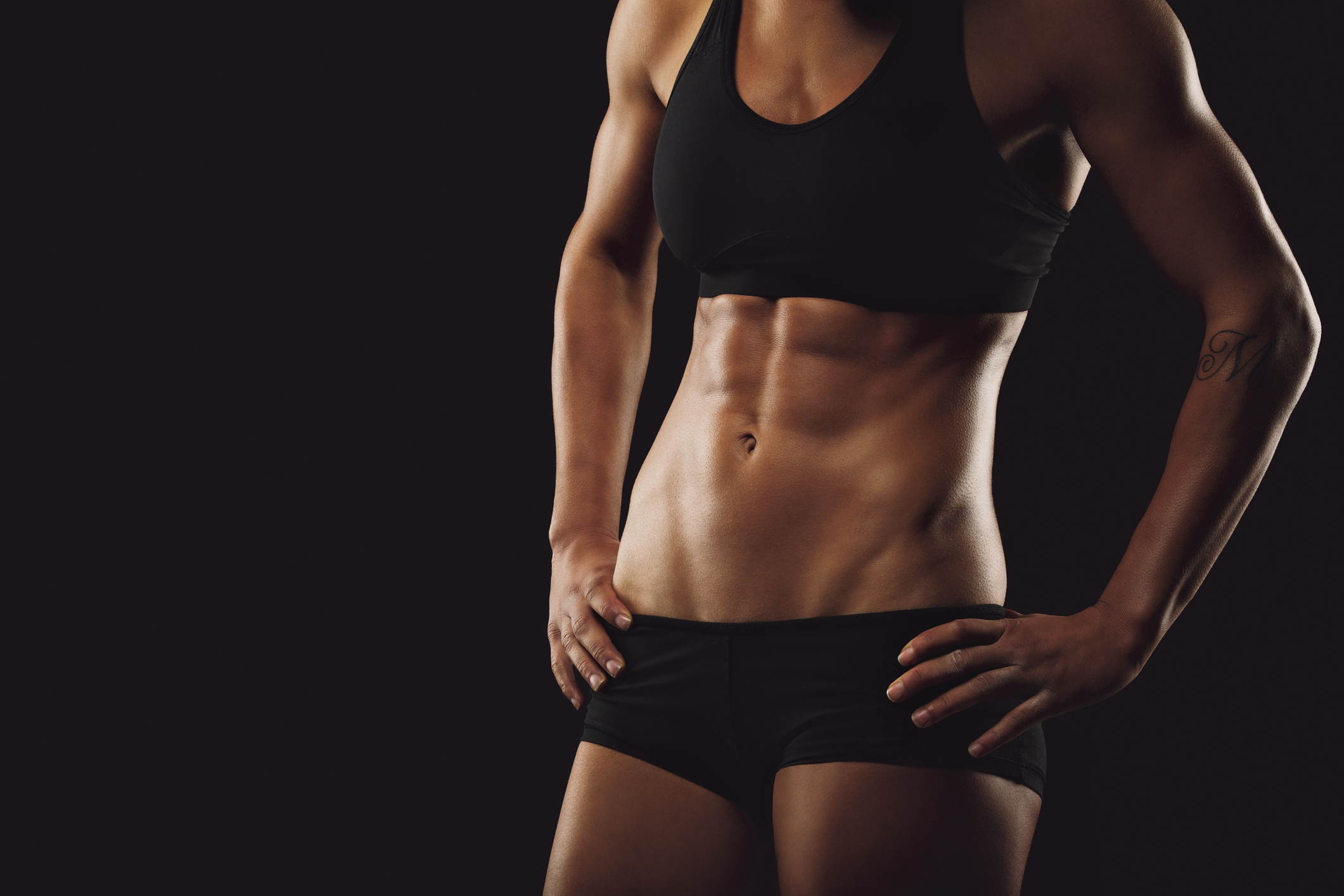(Forgive the controversial title, and please know that I’m not attacking other women who have abs or want abs.)
I get it. There’s something about the idea of having a perfectly fit body that is super appealing.
And honestly, there’s nothing wrong with having a body composition goal.
But we need to get real about WHY.
Why do you want abs? Why do you want to be lean and fit? Why do you want people to see you as “the fit one”? Why do we associate health with a certain appearance?
If we were honest, I think we’d recognize that having a goal of a “perfect looking” body is because we associate this look with confidence, acceptance, and happiness.
But it breaks my heart when I see my clients and my female friends feel depressed or inadequate when they’re comparing their bodies to others, or to their past selves.
Even when their past bodies were achieved by clearly disordered eating and exercise behaviors – they still grieve the loss of the body that they felt represented beauty and attractiveness.
Even though they know they weren’t really happy at that time.
And it’s easy to believe that a perfect body would make us happy when we look at all the Instagram fitness models who have huge smiles on their face while their ripped abs poke out from above their yoga pants.
But is this true? Does a “perfect” or even “great” body really bring us lasting happiness?
MY STORY (AKA TIME FOR SOME #REALTALK)

Me in 2006 at 19 years old
From my own experience, having what many people would consider a “perfect” body didn’t make me deeply happy.
In 2006, I lost about 30 pounds when I transitioned from high school to college, thanks to a rigorous D3 volleyball training schedule.
I won’t lie… At first, this weight loss and sudden attention from others made me feel really good.
It was nice to feel good about how I looked in a bathing suit. It was fun getting compliments from strangers about my physique. It was a confidence booster to finally get noticed by men boys when I had been the definition of a wallflower in high school.
But was I truly happy? Did I really feel secure or accepted? Did I have a strong sense of my identity?
Not really.
I was super insecure and still felt like my stomach was too big, even in the above photo. I was in a relationship that kept me feeling inadequate and unattractive. I started believing the lie that if I could get a flat, defined stomach, that my relationship would finally have stability and security. (My then-boyfriend was still obsessed with his ex-girlfriend who most definitely had six-pack abs.)
I never felt good enough. I didn’t have any deep, vulnerable friendships in the first few years of college. I had absolutely no clue about God or His love for me, and I desperately tried to fit in with the “cool kids”in college by binge drinking, trying to wear the latest fashion, joining a popular sorority (that I basically had no friends in), and sleeping around with guys I barely knew once I mustered the courage to break up with my college boyfriend.
Outside I looked pretty. Beautiful, even. But inside I was a MESS.
Fast forward ~10 years and even though I’m about 10-15 pounds heavier now than I was back then (and at my peak was about 35 pounds above that low weight in college), I feel SO much more secure and self-confident than I ever did at my leanest.
And while it has been a tough road, doing the work to get to this place has allowed my personal life to flourish in ways I always dreamed of… but always thought were out of reach.
I have awesome friendships with women who I deeply trust to talk about anything, and who never make me feel insecure or out of place. I finally have a sense of peace around my diet and exercise choices, and no longer punish myself with restrictive dieting and over-the-top workouts. I’m able to set boundaries in business and social settings without feeling extreme guilt or giving in.
I’m in the most supportive relationship of my life with a man who treats me like a queen every day and always reminds me that I am “more than enough”. And rather than making me feel like I have to use my body to earn love and affection from him, he’s fallen in love with me while maintaining the strength to save sex until we’re married (which is not easy but definitely worth it.) I would have never gotten to this point without a complete overhaul of my sense of self-worth and value as a woman.
Remember: None of this came from achieving a “perfect” body.
Truly it came from…
- rooting myself in my newfound relationship with God;
- starting to accept what He says about my value and self-worth;
- surrounding myself with a community of people who support and love me for who I am and not what I look like;
- finally choosing to break my pattern of pursuing unfulfilling relationships with unavailable, unfaithful men;
- and carefully considering a man’s heart rather than just his outward appearance.
The decision to value myself the way God values me means I eat enough, rest enough, and work out enough to maintain my health and energy without going overboard.
It means I pursue relationships that are life-giving and confidence-building, rather than soul-crushing and confidence-killing.
It means I (mostly) make decisions from a place of obedience to God rather than fear of man or the desire to be accepted by the world, understanding that I am fully accepted in Christ.
Would you like to save this post?
Your email address is 100% safe and will never be sent spam.
I’m a work in progress – and always will be – but the progress over the past few years has been astounding when I consider where I was 10+ years ago.
I’m so grateful for where God has led me to this point.
And while I’m not perfectly detached from the pressure of continuously working on body composition goals, I will say that I’m clear on one thing: My core happiness and self-worth no longer comes from my body’s appearance.
Don’t Believe The Lie
So what’s up with this myth that having a perfect body is somehow going to solve all our problems? What allows our bodies and our appearance to consume our thoughts?
We have four basic human needs that drive all of us at all times: acceptance, identity, security, and purpose.
You can imagine how attaining a “perfect” body could appear to help satisfy those needs. We believe (the lie) that if we just could lose that last 10 pounds or finally see definition in our midsection, that we’d be admired and accepted by others, and that we’d feel secure in our identity as a fit, attractive, and healthy person.
But if you’re not feeling secure, deeply accepted, or LOVED at your current size, you’re definitely not going to suddenly feel that way if or when your body looks a certain way.
What’s worse, a lot of the diet and exercise behaviors that would allow your body to look a certain way can actually cause physical harm and make you miserable, leaving you isolated and disconnected.
And I know it’s so cliche, but you really cannot achieve a stable weight and good health by hating your appearance and trying to beat your body into submission while constantly thinking self-critical thoughts.
So before you start working towards a physique goal, ask yourself these questions:
- Do I have loving relationships with others (partners, friends, family, etc.) that are not going to change based on what my body looks like?
- Are my physique goals tied to my personal sense of value and worth?
- Can I accept and love myself RIGHT NOW before I start trying to change my body?
- Can I still be content with my life if my attempts to lose weight or lean out are unsuccessful?
- Am I willing to value my physical, mental, and spiritual health above reaching my physical appearance goals?
- Do I believe that I am beautiful and loved NOW, not 10/20/100 pounds from now?
My personal belief is that we cannot truly feel the level of love and acceptance we were designed for without a strong personal relationship with God.
I’ve recognized this more and more, especially as my relationship with my fiancé has progressed. As incredibly loving, accepting, and kind as he is, his love will never be enough for me. It wasn’t ever meant to be. And even the best version of “self love” won’t completely fill that hole either.
We were designed for God’s perfect love, and nothing else – no matter how wonderful it is – will take the place of that.
(For more on this topic check out this book and this book.)
Whether or not you have a relationship with God, you need to know that your self-worth as a woman does not come from your appearance. You need to get that belief into your bones.
There’s no magic that happens if you achieve a certain weight or body fat percentage, and any bump in confidence that comes with a “perfect body” is inherently temporary.
Your body will change. You will get old. Your looks will fade.
And then what will your worth be based on?
Do the work that needs to be done to root your self-worth in something that is unchanging.
I believe that unchanging source is God. You may have a different perspective on what that source is, but you need to recognize that your appearance is a seriously shaky foundation to set your self-worth upon.
Before you start a new meal plan or exercise routine to get “bikini-ready by summer” – ask yourself if you’ve done the hard work of rooting your self-worth in unchangeable, unshakeable truth.
And be sure you’re not fixated on the idea that having flat abs will suddenly make you feel valuable, acceptable, secure, or truly beautiful.
Because it won’t. I promise.
You don’t really want abs. You want acceptance and love. You want to feel truly beautiful.
Having the “perfect” body won’t provide that to you, but having a deep sense of unchangeable self-worth and value will.
Start doing the work to identify where your worth and beauty as a woman truly comes from.
And if you are a woman of faith, ask God to show you how captivated and enthralled He is with your beauty as He has created you (not as who you wish you were.)
Now you tell me – do you feel your self-worth is hooked to your appearance? If yes, what steps will you take to change this? If no, what has given you the power to overcome this common struggle? Share your story in the comments below!
This post may contain affiliate links. If you click on a link and make a purchase, I may receive a small commission.

+ show Comments
- Hide Comments
add a comment